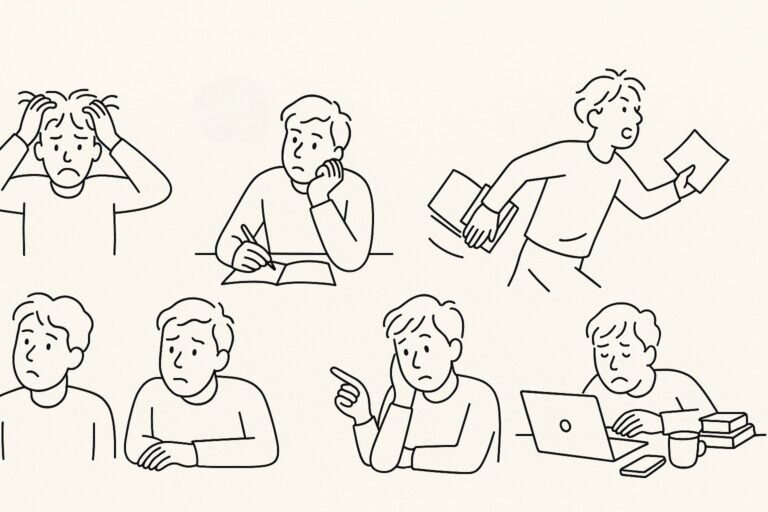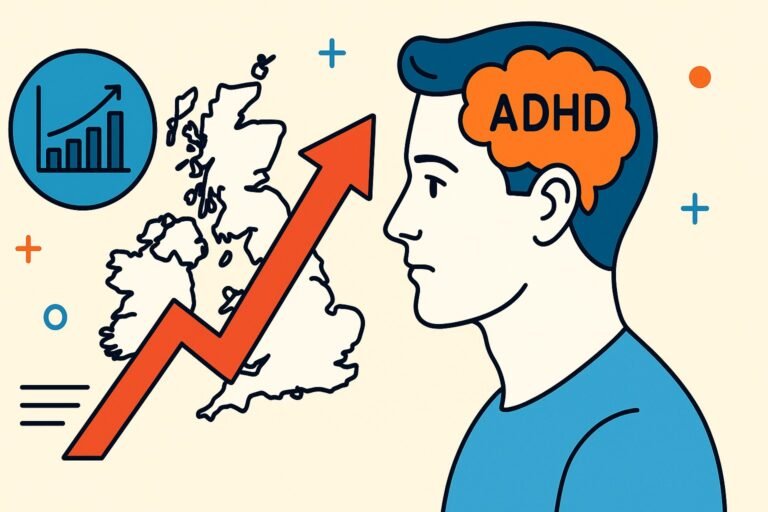Understanding Anxiety Disorders in the UK: Symptoms & Treatments (2025)
Most people experience anxiety at some point in their lives, but understanding anxiety disorders is vital for effective management. You may be dealing with overwhelming symptoms that affect your daily life and well-being. In the UK, common anxiety disorders like Generalized Anxiety Disorder (GAD), panic disorder, and social anxiety can significantly impact your quality of life. This comprehensive guide will help you identify the symptoms, explore various treatment options, and provide useful coping strategies so you can take control of your mental health.
Key Takeaways:
- Anxiety disorders affect a significant portion of the UK population, with various demographics experiencing different challenges related to mental health.
- Common types of anxiety disorders include Generalized Anxiety Disorder (GAD), panic disorder, social anxiety, and specific phobias, each presenting unique symptoms and impacts on daily life.
- Physical symptoms such as heart palpitations and sweating, along with psychological symptoms like racing thoughts, are indicators of anxiety disorders that may differ from normal stress responses.
- Diagnosis typically involves a referral from a GP and can include evaluations by mental health professionals, ensuring individuals receive appropriate support.
- Treatment options in the UK range from NHS services, including cognitive behavioral therapy (CBT) and medications, to private services and alternative approaches such as mindfulness and yoga.
What Are Anxiety Disorders?
Before delving into the nuances of anxiety disorders, it’s necessary to understand their unique characteristics. Anxiety disorders are mental health conditions that cause significant, persistent feelings of fear and apprehension, which can interfere with your daily life. In the UK, these disorders are more common than you might think, impacting individuals across various demographics and leading to debilitating symptoms.
Definitions and Concepts
Disorders like Generalized Anxiety Disorder (GAD) and social anxiety represent chronic conditions that differ from typical stress responses. Your body and mind may react in ways that are disproportionate to the situations you face, often leading to excessive worry, panic attacks, and avoidance behaviors.
Distinguishing Clinical Disorders from Everyday Stress
One way to distinguish clinical anxiety disorders from everyday stress is by examining the duration and intensity of your symptoms. While it’s normal to feel anxious before a significant event, such as an exam or a job interview, clinical anxiety may manifest as a constant, overwhelming sense of dread that hampers your ability to function. You might find that your anxiety is persistent, often escalating without an apparent cause, thereby influencing your mental and physical health.
Concepts of anxiety disorders include understanding that while everybody experiences anxiety, those with clinical diagnoses face more severe and repeated instances that can disrupt their lives. You may notice that everyday stressors are usually manageable and temporary, while anxiety disorders produce intense fear responses that can be challenging to control or overcome, severely impacting your personal and professional life. The contrast lies in the intensity and persistence of symptoms, making it necessary to seek help when anxiety begins to interfere with your daily activities.
Common Symptoms of Anxiety
Even though anxiety is a normal response to stress, persistent anxiety can have a profound effect on your daily life. In the UK, anxiety disorders are increasingly common, affecting millions across various demographics. Understanding the symptoms can help you identify when anxiety becomes more than just everyday stress.
Physical Symptoms
Below are some common physical symptoms of anxiety that you may experience: rapid heartbeat, excessive sweating, muscle tension, and fatigue. These symptoms can manifest in various situations, making it challenging to manage through daily activities.
Psychological Symptoms
Anxiety may lead to an array of psychological symptoms, such as racing thoughts, irritability, and pervasive feelings of dread. These experiences can disrupt your focus and decision-making abilities, impacting both your personal and professional life.
Indeed, psychological symptoms of anxiety can vary significantly from person to person. You may feel a persistent sense of fear or worry that seems disproportionate to the situation at hand. It’s not uncommon to experience panic attacks, which can induce feelings of impending doom. These symptoms can lead to significant distress and may impair your ability to engage in everyday activities, making it vital to seek support if they persist.
Types of Anxiety Disorders
Many individuals experience various types of anxiety disorders that can significantly impact their daily lives. Here are some common types:
| Generalized Anxiety Disorder (GAD) | Characterized by persistent, excessive worry about various aspects of life. |
| Panic Disorder | Involves recurrent, unexpected panic attacks and a fear of their return. |
| Social Anxiety Disorder | Intense fear of social situations, leading to avoidance behavior. |
| Specific Phobias | Excessive fear of a specific object or situation, causing great distress. |
| Obsessive-Compulsive Disorder (OCD) | Involves unwanted, intrusive thoughts and repetitive behaviors. |
Perceiving these disorders can help in understanding their effects, allowing you to seek appropriate treatment and support.
Generalized Anxiety Disorder (GAD)
On average, about 2.5% of adults in the UK experience Generalized Anxiety Disorder (GAD), characterized by a consistent state of worry and tension regarding multiple aspects of life, such as health, finances, and social interactions. This chronic worry can interfere with your normal daily activities and lead to physical symptoms like fatigue and irritability.
Panic Disorder, Social Anxiety, and Specific Phobias
Across various demographics in the UK, panic disorder, social anxiety, and specific phobias are prevalent forms of anxiety disorders. These conditions can reach a point where they significantly inhibit your ability to engage in daily activities. With panic disorder, you may experience sudden and intense fear that can manifest as physical symptoms like a racing heart or shortness of breath. Social anxiety entails overwhelming fear of judgment in social settings, while specific phobias may induce panic in the presence of an object or situation you’ve learned to fear. Understanding these disorders can guide you toward effective management strategies.
Causes and Risk Factors
Once again, understanding the causes and risk factors behind anxiety disorders is vital for effective management. Various elements contribute to the development of these conditions, including:
- Genetic predisposition
- Trauma exposure
- Chronic stress
- Personality types
Recognizing these factors can empower you to address potential risks in your life.
Genetic and Biological Factors
Above all, genetic and biological factors play a significant role in the development of anxiety disorders. These include:
- Family history
- Imbalances in brain chemistry
- Hormonal changes
Perceiving how your genetic makeup influences your mental health can help you navigate your unique challenges more effectively.
Environmental and Psychological Triggers
Before diving deep, it’s important to note that environmental and psychological triggers are also vital in understanding anxiety disorders. These can include:
- Stressful life events
- Negative thought patterns
- Social pressures
Genetic predisposition may heighten the impact of your environment. If you’ve experienced trauma, loss, or prolonged stress, these factors can elevate your susceptibility to anxiety disorders. Understanding that past experiences and current circumstances can trigger anxiety helps you in developing effective coping strategies to improve your mental health.
Diagnosing Anxiety in the UK
To receive a formal diagnosis of an anxiety disorder in the UK, you typically start by consulting your GP, who will assess your symptoms, their duration, and impact on your daily life. With an estimated 8 million adults experiencing anxiety disorders, it’s necessary to recognize that seeking help is a vital step towards recovery. Your GP can refer you to mental health services for a more in-depth evaluation if necessary.
Process of Diagnosis
At your initial appointment, your GP will ask detailed questions about your symptoms and personal history. They may also inquire about any family history of mental health issues, as this can help inform their assessment. The aim is to understand not only your symptoms but also how they affect your overall quality of life.
Evaluations and Assessments
Process evaluations often include standardized questionnaires and clinical interviews designed to gauge the severity of your symptoms. These assessments provide a comprehensive understanding of your mental health and can guide the treatment plan. Your mental health journey is tailored to your specific needs based on the outcomes of these evaluations.
Also, engaging in thorough evaluations helps identify any underlying issues contributing to your anxiety. It could uncover associated conditions, such as depression or PTSD, which require attention. Accurate assessments are necessary for developing an effective treatment strategy, leading to improved mental health outcomes and a better quality of life. Your well-being depends on this careful attention to detail, emphasizing the importance of transparency during evaluations.
Treatment Options Available
Not all treatment options for anxiety disorders are the same, and what works for one person may not work for another. It’s important to explore various pathways to find the best fit for your individual needs. In the UK, both NHS and private services offer a range of treatments designed to manage symptoms effectively and improve your quality of life.
NHS Treatment Pathways
About the NHS, you can access a variety of treatment options for anxiety disorders, including Cognitive Behavioral Therapy (CBT), medication, and online therapy programs. The NHS typically follows a standardized pathway, starting with an initial evaluation by your GP, who may then refer you to specialist mental health services depending on the severity of your condition.
Private and Alternative Treatments
Treatment options extend beyond the NHS, allowing you to choose private services or alternative therapies aiming to complement traditional treatment. Many private practices offer quicker access to psychotherapy, specialized treatments, and flexibility with appointment times. Alternatively, you can explore holistic approaches like yoga, mindfulness, or journaling, which can be helpful for managing symptoms. However, be cautious when considering alternative options, as not all methods are scientifically validated. Seek guidance from qualified professionals to ensure safe and effective care tailored to your specific needs.
Final Thoughts: Destigmatising Anxiety
Unlike the prevalent misconceptions surrounding anxiety, you should understand that it is a legitimate mental health condition affecting millions in the UK. By acknowledging your experience and seeking help, you break the cycle of shame and isolation often associated with anxiety disorders. Embracing open conversations about mental health not only fosters understanding but also encourages others to seek the support they need. Your journey towards managing anxiety can inspire change, paving the way for a society that values mental well-being and promotes healing for everyone.
FAQ
Q: What are the most common symptoms of anxiety disorders?
A: Common symptoms of anxiety disorders can be categorized into physical and psychological symptoms. Physical symptoms may include heart palpitations, sweating, trembling, dizziness, and fatigue. Psychological symptoms often involve persistent worrying, racing thoughts, irritability, and difficulty concentrating. Individuals may also experience restlessness and feelings of impending doom as part of their anxiety.
Q: How are anxiety disorders diagnosed in the UK?
A: In the UK, anxiety disorders are typically diagnosed by a general practitioner (GP) or a mental health professional. The process usually involves a comprehensive evaluation where the doctor will ask about symptoms, medical history, and any relevant life events. Additionally, psychological assessments may be used to further understand an individual’s mental health. After the evaluation, the GP may provide a referral to specialized mental health services if necessary.
Q: What treatment options are available for anxiety disorders in the UK?
A: Treatment options for anxiety disorders in the UK include both NHS services and private options. NHS treatment typically involves cognitive behavioural therapy (CBT), medication such as antidepressants or anti-anxiety medications, and access to online therapy platforms. Private treatment can offer quicker access to therapists and alternative therapies. Additionally, complementary approaches like mindfulness practices, yoga, and journaling can support those dealing with anxiety.
Q: What self-help techniques can individuals use to manage anxiety?
A: There are several self-help techniques that can assist in managing anxiety. Breathing exercises, such as deep diaphragmatic breathing, can help calm the nervous system. Grounding techniques, which involve focusing on the present moment and the surroundings, can also be effective. Establishing routines and setting boundaries, both in personal and professional life, can contribute to a greater sense of control and reduced anxiety.
Q: When should someone seek professional help for anxiety?
A: It is advisable to seek professional help if anxiety begins to interfere with daily activities, relationships, or overall quality of life. Signs to look out for include persistent worries that don’t go away, physical symptoms that are overwhelming, or a significant decline in functioning at work or school. If self-help techniques do not provide relief, reaching out to a mental health professional is important for receiving appropriate support and treatment.







